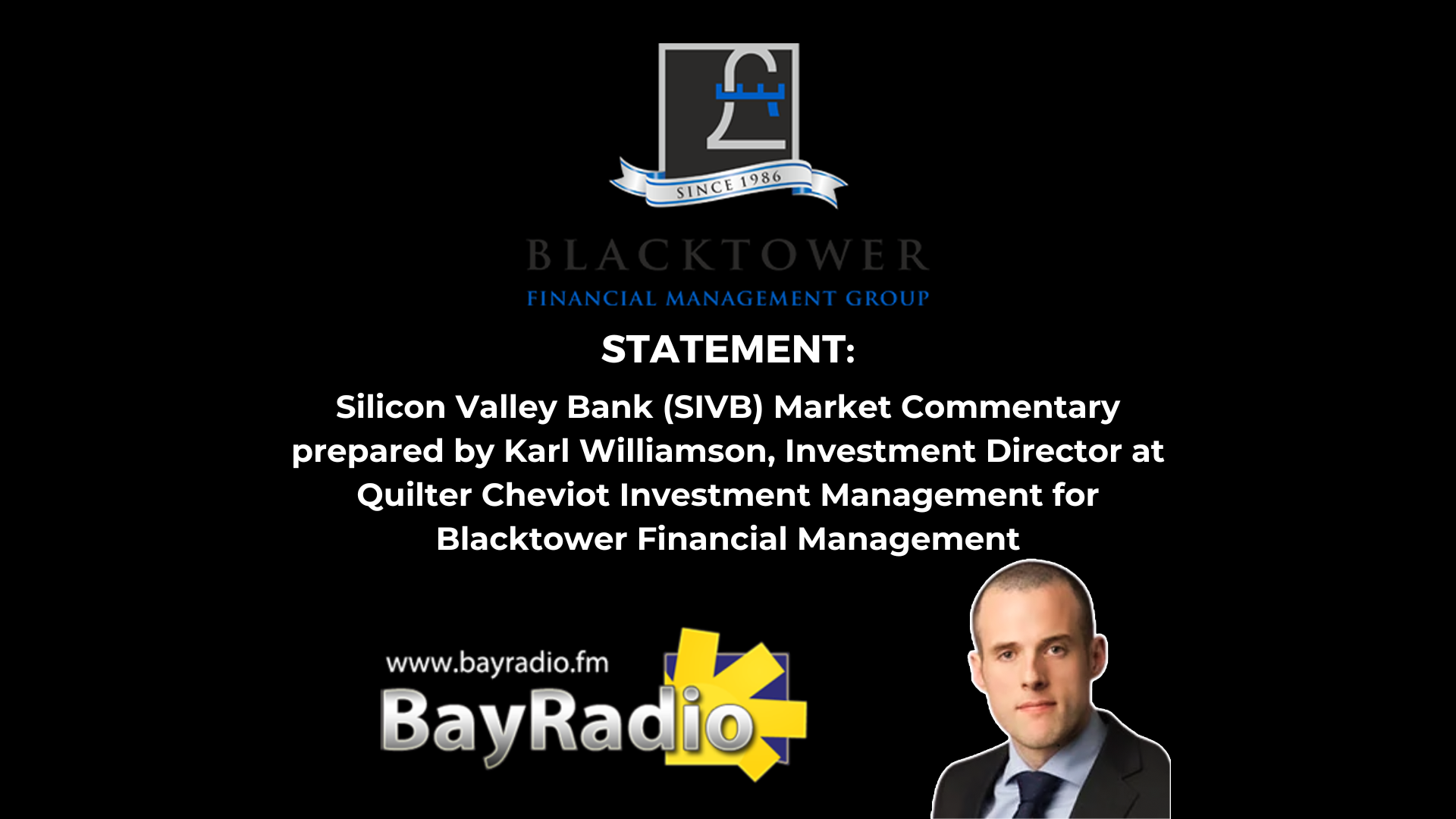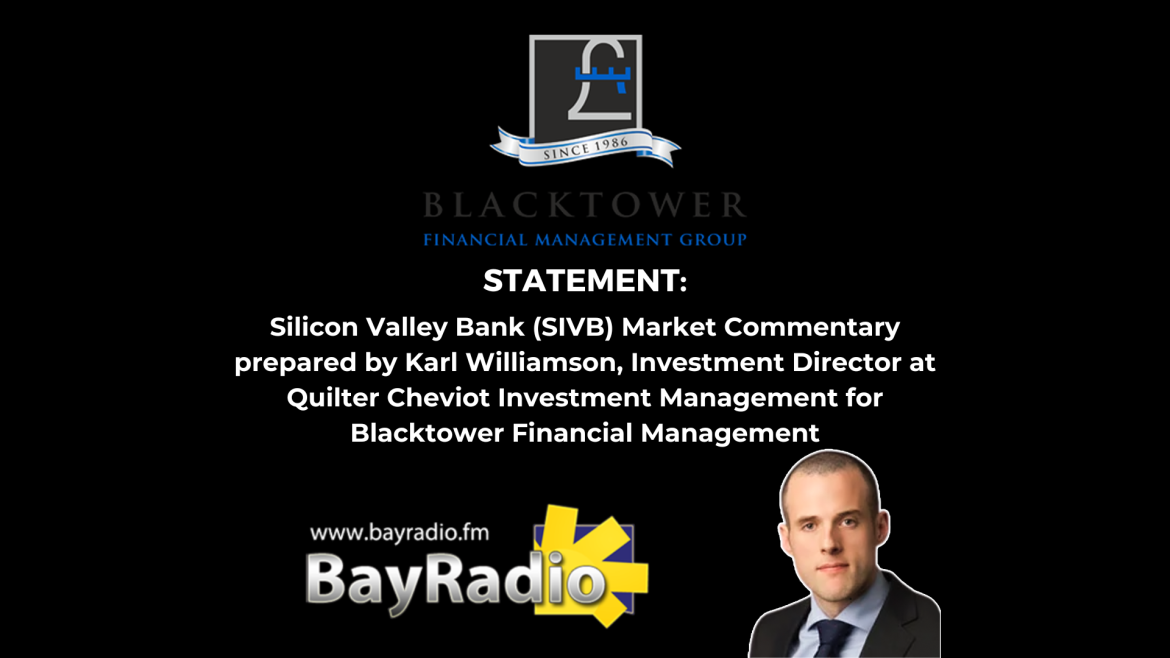-
 play_arrow
play_arrow
BayRadio Listen Live Broadcasting in Spain
Insights into Silicon Valley Bank Market Trends: An Expert Analysis by Karl Williamson, Investment Director for Quilter Cheviot Investment Management for Blacktower


Global equity markets posted their worst weekly return in five months last week, with the MSCI All Country World Index declining 3.5%. The selling accelerated on reports of the collapse of Silicon Valley Bank (SVB), a Californian financial institution that played a key lending role for technology start-ups.
The bank’s failure, the second-largest bank failure in US history, is the surest sign yet of stress in the financial system following the sharp increase in interest rates in the past 12 months. That said, the closure should be kept in perspective and, from what we can tell at present, calls for this being another “Lehman moment” are based far more on hyperbole than facts.
SVB’s issues come from its business practice of receiving deposits that could be termed “flighty”, often from venture capitalists, and then investing them in longer-term, fixed-rate bonds. The difficulties facing technology-based venture capitalists during the challenging market environment of the past 12 months have meant that deposits have increasingly been withdrawn, a process which accelerated as solvency rumours began to swirl. On the other side of the ledger, SVB’s investments in fixed-rate bonds have suffered from rising interest rates. SVB increased the rate it paid on deposits in an attempt to stem outflows and attract new capital, but this ultimately meant a squeeze on net interest rate margins.
Taken together, it is not hard to see why this proved problematic, but it also shows why the risks are in many ways specific to SVB and unlikely to be symptomatic of large swathes of the banking industry. Furthermore, regional banks like SVB are not subject to the same level of accounting and regulatory treatment as bigger banks which have been the target of stringent measures since 2008 specifically designed to avoid a repeat of the global financial crisis.
Unsurprisingly financials, and in particular banks, weighed on equity markets as contagion fears spread among investors but this does not appear to be indicative of systemic weakness – it’s interesting to note that the decline in value last Friday in JP Morgan’s stock (US$22bn) was far larger than the decline in SVB’s own stock (US$9.5bn) – and several response measures announced over the weekend are reassuring. SVB depositors will be made whole, and not just up to the Federal Deposit Insurance Corporate (FDIC) limit of US$250,000 – a welcome development given that many deposits were well in excess of this, coming from corporate treasurers and the like. The Federal Reserve (Fed) have also launched a new one- year lending programme for banks, which can be used to cover deposit outflows.
The news caused large moves in bond markets, due to the growing belief that it will prevent the Fed from maintaining a hawkish course and continuing to raise interest rates. Terminal rate expectations have been revised sharply lower in derivatives markets, with traders now seeing a peak of 4.80% – down from a recent peak of 5.60%. The current Fed funds rate is 4.50%-4.75%. The US two-year Treasury yield has fallen sharply, posting its their steepest three-day decline since October 1987.
Longer-dated bonds have also recorded sizable declines, with the US 10-year Treasury yield falling to 3.50% from above 4.00% at the start of the month. European government bonds have followed suit, with the 10-year gilt yield trading down to 3.4%, around 40 basis points lower than when the news broke.
Following discussions over the weekend, HSBC has announced the acquisition of SVB UK for £1. The UK arm of SVB’s operations has £6.7bn of deposits, £5.5bn of loans and 3,300 clients, including start-ups, venture-backed companies and funds. The Bank of England (BoE) had warned of plans to place SVB UK into insolvency following the collapse of its parent. The move was welcomed by the UK government and the preferred choice of chancellor Jeremy Hunt, avoiding any public intervention in order to protect depositors.
UK shares outperformed last week, with large-cap benchmarks falling around 2.5%. The pound continues to trade in a relatively narrow range against the US dollar, around the 1.20 level.
Written by: BayRadio News
Similar posts
Recent Posts
- Robotic Surgery for Prostate Cancer: What Is Radical Prostatectomy and How Does the Da Vinci Robot Improve It
- What Is Fibromyalgia? Symptoms and Treatments of an Invisible Illness That Requires Specialized Attention
- AMASVISTA Glass: 10 reasons to choose SUNFLEX glass curtains
- Robotic Surgery, Immunotherapy and Comprehensive Care Take Centre Stage at Pancreatic Cancer Conference at Quirónsalud Torrevieja
- Robotic Surgery Against Ovarian Cancer: Greater Precision, Less Pain and Faster Recovery

Ctra. Cabo La Nao, CC La Nao, Local 6 03730 Javea, Alicante, Spain
Advertise with us
Do you have a business in Spain? Do you provide a service to the expat community in Spain? Would you like your message to reach over 500.000 people on a weekly basis?
BayRadio is a community orientated radio station offering fantastic content to our many listeners and followers across our various platforms. Contact us now and find out what Bay can do for you!
Our business is helping your business grow.
BAY RADIO S.L. © 2024. ALL RIGHTS RESERVED. WEB DESIGN BY MEDIANIC







